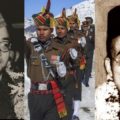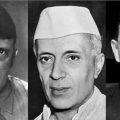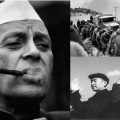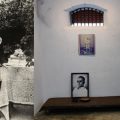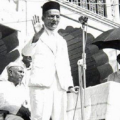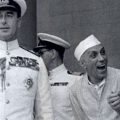How Merciful Were British to Nehru and Harsh to Savarkar: The Contrasts
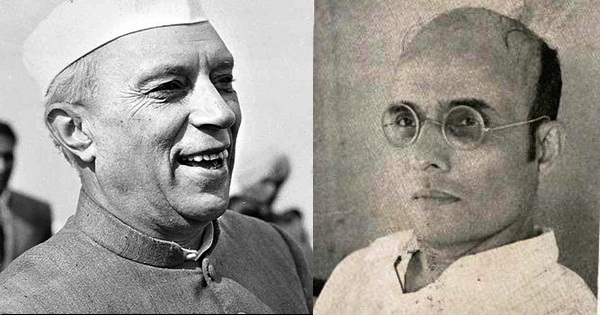
Recently, Congress workers garlanded the statue of Swatantryaveer Savarkar with shoes, and blackened it. They openly boasted this act, without the slightest fear of reprisal in the soon-to-come Assembly elections in Maharashtra in October 2019, where Savarkar is an icon.
On Twitter as well as in public, Congress workers & leaders and other leaders like one of RJD have called Swatantryaveer Savarkar (Meaning of it “Hero of Independence” Savarkar) a ‘coward’ and a ‘traitor’. [Mostly out of jealousy, and basic tendency to defame any opponent of Jawaharlal Nehru and the Congress Party.] They have purportedly given the reason as Savarkar writing petitions to the British while in jail in the Andamans, where he was incarcerated from 1911 to 1921. In reality, those petitions were a ‘strategic letter of ploy’ to get out of jail, for which Savarkar should be praised. Congress has a history of harassing Savarkar since 1910 when Jawaharlal Nehru refused to donate for Savarkar, according to an article by Shreerang Godbole in weekly Organiser in 2004. Read to know. We will see this in detail later too in another article.
Savarkar was a disciple of Shivaji. In 1666 in Agra in Aurangzeb’s captivity, Shivaji wrote such a letter to Aurangzeb to secure his release. Shivaji made many promises in that letter to Aurangzeb. But when he escaped these promises evaporated into thin air.
Congress should be pin-pointedly asked if it considers Shivaji a ‘traitor’ for writing such a letter to Aurangzeb in 1666. On Twitter, Congress workers were cornered when this writer raised this issue and pin-pointedly asked them why it was a ‘strategic letter of ploy’ when Shivaji did it, and ‘an act of treason and cowardice’ when Savarkar did it. Congress cannot dare to call Shivaji a ‘traitor’ and a ‘coward’ ever!
Of course, those petitions by Savarkar did not have any impact on the British who understood that they were his ploys to get out of jail. Savarkar did not believe in Satyagraha. Once in jail, all means fair and foul were justifiable to get out. If he was caught, he thought it correct to give any undertaking to secure his release, just like Shivaji did. Savarkar himself talked of these letters in his book “My Transporation” (Majhi Janmathep in Marathi) which is mentioned in Samagra Savarkar Wangmaya Vol 1, pp 448/620, 690. Savarkar wrote what talks he had with Sir Reginald Craddock in 1913, with members of Jail Commission, with the Governor about his release from Jail and what restrictions he would accept for his release from the Jail.
Congress’ allegation that Savarkar supported the two-nation theory is answered here. Savarkar himself answered this charge in his lifetime and clarified that he always opposed the Partition of India and was for a United India. Those of Italian origin who took 15 years after marriage to Rajiv Gandhi in 1968 to even apply for Indian citizenship have the audacity to insult National Heroes and fiery patriots like Savarkar! To know a little about Savarkar read.
However, now it is time to reveal some contrasts between how the British treated Jawaharlal Nehru, and how they treated the Savarkar brothers, not just Swatantryaveer Savarkar.
What kind of life Savarkar had to face in jail in the Andamans from 1911 to 1921? Here are a few notings:
(I) 6 months solitary confinement;
(II) Seven days standing handcuffs
(III) Absolutely refusing to work, ten days crossbar fetters imposed.
(Source material for a history of the freedom movement in India Vol. II,. Bombay Government publication: pp- 478/479).
How many top leaders of the Congress had to suffer such punishments? British kept Nehru and even Gandhi at times in palatial guest houses with all facilities.
How sympathetic were the British to Jawaharlal Nehru? Only a few of the many instances are given here.
Jawaharlal Nehru’s father Motilal died on February 6, 1931, in Lucknow, with Jawaharlal Nehru and Gandhiji at his bedside. How could Gandhi and Nehru be at his bedside? Because “On January 25th [1931] Viceroy, Lord Irwin, ordered the unconditional release of Gandhi and the members of the Congress Working Committee, including Nehru.” [Source: Frank Moraes- Jawaharlal Nehru, p 171. Frank Moraes’ biography of Nehru is considered very authentic.] That means that Lord Irwin ordered unconditional release of Nehru and Gandhi a few days before Motilal Nehru died. It is obvious that at least some of the leaders [like Jawaharlal Nehru] would have made the British a verbal request for this liberty to see Nehru’s ill father on his deathbed. The British were so kind to them as to release them unconditionally.
Frank Moraes writes on page 251 of the book Jawaharlal Nehru: “News of [Jawaharlal Nehru’s wife] Kamala’s health was bad and distressed him further, aggravating his sense of helplessness. In June 1934, Nehru had began writing his autobiography, partly to clear his own mental cobwebs by putting down his thoughts on paper, and partly to divert his mind from the depression which enveloped him…On the night of 11th August (1934) Jawaharlal Nehru was brought from Dehradun to Allahabad under police escort and there informed that he was to be released temporarily in order to see his ailing wife. He was to be at liberty for eleven days.”
p 252 “Nehru had given the government no undertaking when he came out of jail, but he felt it would be improper to engage in political activities during the respite they had allowed him.”
p 255 “(After his 11 day respite was over) He was taken this time not to Dehradun but to Naini jail in Allahabad so as to be near his wife….For two weeks he received a daily bulletin from the doctors attending her, but then these ceased, although Kamala’s health was deteriorating….”
p 256 “A month after his rearrest [rearrest was on 23 August 1934] Jawaharlal was taken home for a brief visit to his wife….Early in October they took him out again to visit Kamala…It was decided to move Kamala to a sanatorium in the hills at a place called Bhowali. The day before she left, Nehru was again taken out of jail to pay her a fleeting visit.”
p 257 “Three weeks later Nehru was transferred from Naini [in Allahabad] to Almora prison so as to be nearer Kamala. Bhowali was on the way and Nehru stopping there en route, the improvement in Kamala’s health cheered him, lifting his heart…”
p 259 “After he had been a month in Almora jail, Nehru was taken to Bhowali to see Kamala and thereafter he was permitted to see her approximately once every third week until May 1935, when she left for Europe for treatment.”
Nehru’s wife, Kamala, went to Europe for treatment in May 1935. Frank Moraes writes: “On September 4, 1935, Nehru was suddenly discharged from Almora, five and half months before his term was to expire…[On 5 Sept] On the same afternoon he set out by Air for Europe…On the evening of September 9th, he reached Badenweiler” (in Germany). [ Jawaharlal Nehru, p 246.]
Obviously, all this happened on Nehru requesting the British for it (at least verbally).
No one grudges this sympathetic treatment to Nehru. One only wishes that people should know that the Savarkar brothers met their family members only once in 10 years in the Andamans. And in this meeting, Savarkar’s elder brother Babarao came to know that his wife had died earlier. [Watch this video, time 2:03:00 to 2:06:00]
Nehru was released from jail months before his term was to end, and he was allowed to fly by plane to Europe in 1935 (in those days) to see his ill wife, by the British. But the British did not even inform either of the Savarkar brothers that the elder brother’s wife had died, not to talk of allowing them to visit her when ill, or even allowing a visit on parole after her death!
Nehru was kept in a palatial guest house in Almora. But so harsh were the British to Savarkar brothers, that they made them do the work of a bull of taking out oil from jail in Andamans.
The British also did not even inform for many months either of the Savarkar brothers that their other brother is also in the same jail in Andamans! Neither elder brother Babarao nor Swatantryaveer Savarkar knew for many months that their other brother is also in the same jail!
As against this, in 1934 Nehru’s jail was shifted by the British from Dehradun to Naini in Allahabad so as to be near Kamala (obviously as per his verbal request). Then when Kamala was sent to a place called Bhowali in the hills for better medical treatment, Nehru’s jail was against shifted from Naini in Allahabad to Almora, so as to be close to Kamala. After this, he was permitted to visit her once every three weeks on parole from November 1934 to May 1935, till the time Kamala left for Europe for treatment.
Leaving his jail term, Nehru asked British leniency to be with his ill wife. At one time in 1934 he got a parole for 2 days a week when his wife was in India and he went to visit her. He was sent her medical bulletins everyday in jail on the days he wasn’t on parole. He had daily newspapers to read in his jail where he was imprisoned. Of course, the contrasts with Savarkar brothers’ couldn’t be starker. No one sent them a bulletin of the health of the elder brother’s wife in jail.
Also, there was no concern by the British about the health of the wife of elder brother of Veer Savarkar i.e. Babarao Savarkar. She was not given treatment in Europe. Savarkar brothers’ jails were not changed so as to be near the wife of Babarao, and Babarao was not given parole very frequently to visit his wife. In case of Nehru, not only did he ask British for all this and get it, he got his own release from jail 5 and half months before his term ended, and permission by the British to fly by plane to visit ill wife in Europe. And Nehru was with her in Europe from September 1935 till her death in February 1936. Nehru returned to India in March 1936 after spending few days with 18-year old daughter Indira in Europe, after the death of Kamala.
Frank Moraes further writes: “Nehru had given the British Government no undertaking when he came out of jail, but he felt it would be improper to engage in political activities during the respite they had allowed him.” (p.238). The British Government was sure that he would not take part in politics and hence did not impose the condition. However, in Savarkar’s case, the Government imposed the condition that he should not engage in political activities. How could it trust a man who jumped the ship at Marseilles into the sea and swam to France in 1910?
Now how was Savarkar treated in jail in the Andamans? The following three excerpts show it:
(I) Bombay Government does not recommend any remission of the sentences passed upon Ganesh Damodar Savarkar [elder brother Babarao] and Vinayak Damodar Savarkar. [p. 467]
(II) ‘Government of India agrees that the Savarkar brothers should not be released under the Royal Amnesty.’
This is dated 8th December 1919. [p. 469]
(III) ‘The Government of Bombay by their letter No. 1106/36, Home Department, dated 29th February 1921, informed the Government of India that the Governor in Council was not in favour of the transfer of the Savarkar brothers from Andamans to a jail in the Bombay Presidency, as that would lead to a recrudescence of agitation in their favour.’ (p.477-478, Source material for a history of the freedom movement in India, Bombay Government publication.)
They showed the Government’s worry and public sympathy for Savarkar in 1921, there was absolutely no impact of Savarkar’s petitions on the British, who understood them to be ‘strategic letters of ploy’. Still, Savarkar should be lauded for trying to beguile the British with those ‘ploys’.
The Congress first demanded full Independence (Poorna Swarajya) for India in December 1929, a full 44 years after its foundation. Its demand in the 1920s, till the 1929 Lahore Session was only dominion status for India.
And in its initial years, in the 1880s and 1890s, the Congress leaders openly stated the British Rule in India as the Providential Gift! It took the Congress many years (at least 20 years) to raise a strong foundation, though it was formed with merger of many regional conferences, unlike RSS which was founded from zero.
And yet, the Congress (which ceased to be same since 1969 when it became Congress (I) with a split in the party) has lied about true patriots i.e. RSS and hid its own record of its first 44 years, particularly, the first 22 years.
As late as 1911, the then Congress President Bishan Narayan Dar said in his Presidential address in the 1911 Congress session that the British rule was ‘still the greatest gift of Providence to my race’. (Source: “Pt Bishan Narayan Dar’s speeches and writings”, edited by H.L.Chaterjee, Lucknow 1921, Presidential address 307 of 1911).
This means that at a time when patriots like Savarkar fought British bullets jumping into the sea, called the 1857 revolt as a ‘War of Independence’, the Congress party was calling the British Rule in India as ‘God’s gift’!
Naturally, that is why this party (Congress) is very eager to discredit people like Swatantyraveer Savarkar, who fought for ‘Complete Political Independence for India’ and announced this as their goal as early as 1900 (when he was only 17 years old), since its own record of those years is like this. And of course, it will call Savarkar a traitor & a ‘coward’ since the acts of Congress’ First Family Founder Jawaharlal Nehru could fit in the category of the second, particularly in 1934-36 during the time of the illness and subsequent unfortunate death of his wife Kamala due to illness.
Swatantryaveer Savarkar died in 1966 and is not alive to refute the charges levelled by Rahul Gandhi, NSUI leaders and others. Some have tried to hold Savarkar guilty in the murder of Mahatma Gandhi despite the fact that Savarkar was acquitted on 10 Feb 1949 and the Nehru Government dared not appeal against the acquittal. Savarkar was, of course, the byword of patriotism and courage, called so by Indira Gandhi herself. He had jumped into the sea from a ship from where he was being transported by the British at Marseilles in 1910 and swam to France braving bullets of the British Police, fighting death all along the way. [Watch this video from time 1:06:25 to 1:11:25]. Such a patriot, whose anti-British patriotic poems are still found very inspiring, motivating and emotional was called a ‘staunch supporter of British colonialism’ by The Wire, and a British stooge, a traitor and a coward by leaders of Congress, RJD, Left and others!
But karma has hit them back, and they have all suffered for what they did. The entire Left is today of 5 Lok Sabha MPs (3 of CPM, 2 of CPI) of which 4 won due to only DMK support in Tamil Nadu, RJD has zero Lok Sabha MPs, while the Congress has twice in a row failed to get enough seats to get the Leader of Opposition post. Congress is at its lowest in Maharashtra, with just 1 MP out of 48, in a state which was once its citadel.

